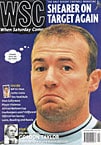 Russia hope to host the 2008 European Championship, but their infrastructure is at home in a previous age, says Kevin O'Flynn
Russia hope to host the 2008 European Championship, but their infrastructure is at home in a previous age, says Kevin O'Flynn
First they let Lennart Johansson set up shop in the Kremlin. A few days later Sepp Blatter was discussing tactics with acting president Vladimir Putin over a football match.
Housed inside the Kremlin the trade fair, Football Market 2000, organised by UEFA, was supposed to help drag Russian clubs into the brand new world of super stadiums. Undersoil heating firms stood next to Kappa and beside the artificial turf man who was wooing visitors away from the plastic seat manufacturer.
Russia announced at the fair that it was going to bid for the 2008 European Championships and the ever diplomatic Johansson said “Why not?”. Moscow hosted the UEFA Cup final in 1999 – but no one really believes that Russia has a chance of staging the finals.
There is enough potential, with more than 60 professional clubs and tens of millions of amateur players, but the country is still reliant on an enormous crumbling football infrastructure built in Soviet times. Attendances are beginning to increase but there’s only one international quality stadium in the country, Moscow’s Luzhniki Stadium.
UEFA is providing some finance to help with the development of youth football. A centre is being built in the south of Russia which will take in talented youngsters from the vast region. But despite the friendly relations, tensions exist between the western, modernised football world and Russia in a mirror reflection of the political situation.
Oleg Romantsev, in his place as Spartak Moscow and Russia coach, has thrown tantrums at UEFA accusing referees and the rest of Europe of cheating to get rid of Russian clubs. Why? Because clubs didn’t want to come to such a scary country where apartments get blown up in the middle of the night.
That’s typical of Romantsev – a chain-smoking hangdog version of Alex Ferguson – who is convinced everyone is out to stop him, but it also reflects Russian fears, not only in football, that the western world is increasingly against them. The only time that the warring CSKA and Spartak fans came together last year was to throw paint and eggs at the US embassy during the Kosovo conflict.
But although Russian FA chief Vyacheslav Koloskov described 1999 as “a disaster season at home and abroad” it’s unlikely he will rock the boat by blaming the west. Koloskov is one of those wily bureaucrats who’s been around forever. He hustled to claim for Russia the sole place given to the ex-USSR in the qualifiers for the 1994 World Cup above a Ukraine side as good if not better. He knows when to ignore Romantsev’s hot air.
A more reasonable worry is the exodus abroad of Russian players which Putin talked to Blatter about. The two nattered away in German – Putin speaks fluent German after 15 years playing away working for the KGB in East Germany – in what could be an important sign. It was the first such meeting between a Russian leader and the FIFA chief. Everyone here knows that nothing will ever get done without government help. “Unless the economy improves it’s impossible,” said Vladimir Rodionov, general secretary of the Russian FA. “We need to make football a national idea as it is in England and Italy.”
That looks a few years off yet. Russians still have many other things to worry about but one thing from the fair that made me optimistic is the first Russian football sticker book. Swap-pers, who gather in a local park at weekends, have previously only been able to trade cards from English, Spanish and Italian leagues.
The only shame is that the book is one for old Soviet and Russian sides – no one has faith yet that stickers of Fakel Voronezh’s back four will sell here.
From WSC 158 April 2000. What was happening this month